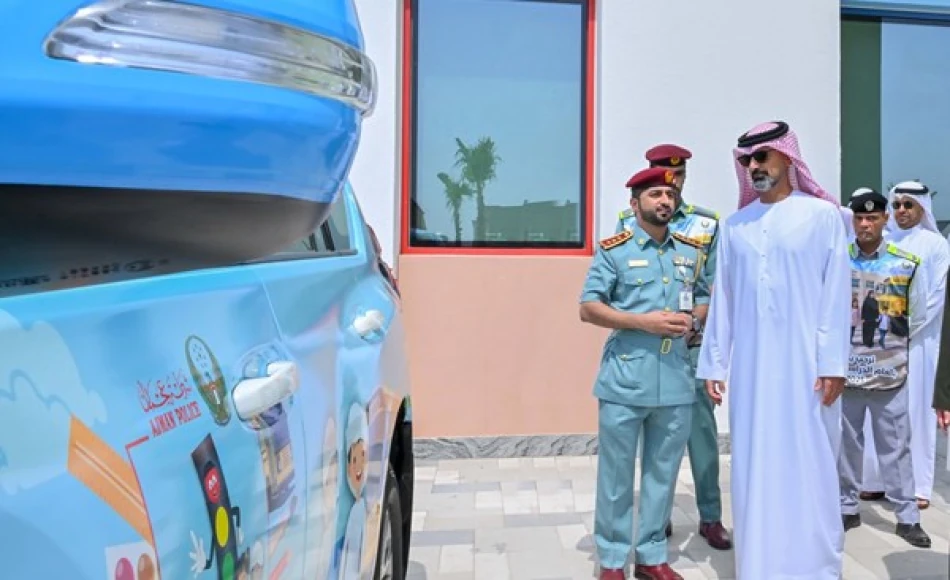
Ammar bin Hameed Launches School Patrol Program to Enhance Road Safety for Students
Ajman Launches Pioneering School Patrol Initiative to Transform Student Safety and Traffic Culture
The Emirate of Ajman has unveiled an ambitious "School Patrol" program that goes beyond traditional traffic management, positioning itself as a comprehensive safety and community engagement model. Launched by Crown Prince Sheikh Ammar bin Humaid Al Nuaimi alongside the opening of the new academic year 2025-2026, this initiative represents a strategic shift toward preventive policing and community partnership in one of the UAE's most densely populated emirates.
Beyond Traffic Control: A Holistic Safety Ecosystem
The School Patrol initiative encompasses multiple objectives that extend far beyond managing morning rush-hour congestion. The program aims to regulate traffic flow around educational institutions, monitor school environments, strengthen police-community relations, reduce road accidents, and train school security personnel in traffic management. Critically, it focuses on building traffic awareness among both students and parents—a long-term investment in behavioral change.
Crown Prince Sheikh Ammar emphasized that the patrol's mission transcends its traffic role, stating it will contribute to "building an aware generation that possesses traffic culture and positive behaviors." This approach reflects a growing recognition across the Gulf states that sustainable safety improvements require cultural transformation rather than enforcement alone.
Strategic Timing and Regional Context
UAE's Broader Safety Vision
The launch coincides with the UAE's continued focus on becoming a global leader in road safety and smart city initiatives. The timing—alongside the inauguration of the Zayed Educational Complex in Al Raqaib area—signals Ajman's commitment to integrating safety infrastructure with educational development. This mirrors similar comprehensive approaches seen in Dubai and Abu Dhabi, where traffic safety has become embedded in urban planning.
Addressing Growing Urbanization Challenges
Ajman, as the UAE's smallest emirate by area but with significant population density, faces unique traffic management challenges. The emirate's rapid residential development has intensified congestion around schools, making this initiative particularly timely. The program addresses a critical gap where traditional traffic enforcement meets community policing—a model that could prove valuable for other rapidly growing cities in the region.
Operational Framework and Innovation
Colonel Khalid Mohammed Al Nuaimi, Deputy Commander General of Ajman Police, outlined the patrol's comprehensive mandate. Officers will manage traffic during peak hours, assist students in safe road crossings, monitor traffic violations, and participate in school activities to promote legal compliance and positive behavior. This multi-faceted approach represents a departure from reactive policing toward proactive community engagement.
The integration of educational outreach within operational duties is particularly noteworthy. By having patrol officers participate in school events and awareness campaigns, Ajman is creating sustained touchpoints between law enforcement and the community—a strategy that has shown success in countries like Singapore and parts of Canada.
Market and Policy Implications
Investment in Human Capital
From an economic perspective, this initiative represents significant investment in human capital development and public safety infrastructure. The program's focus on training school security personnel creates a multiplier effect, expanding safety expertise beyond the police force. This approach could reduce long-term public safety costs while improving educational outcomes through enhanced school environments.
Regional Competitive Advantage
For investors and businesses considering the UAE market, such comprehensive safety initiatives enhance the emirate's attractiveness as a family-friendly destination. The program's emphasis on building "an attractive and safe environment for students and parents" directly supports Ajman's positioning in the competitive regional education and residential market.
Long-term Impact and Scalability
The School Patrol initiative's true significance lies in its potential as a replicable model. By combining immediate safety improvements with long-term cultural change, Ajman is creating a framework that addresses both symptoms and root causes of traffic safety challenges. The program's success could influence similar initiatives across the Gulf region, where rapid urbanization continues to strain traditional traffic management approaches.
The emphasis on building "preventive awareness values" among students suggests this initiative is designed as a generational investment. If successful, it could produce measurable improvements in traffic safety culture over the next decade, providing valuable data for urban planners and policymakers throughout the region.
Most Viewed News

 Layla Al Mansoori
Layla Al Mansoori






